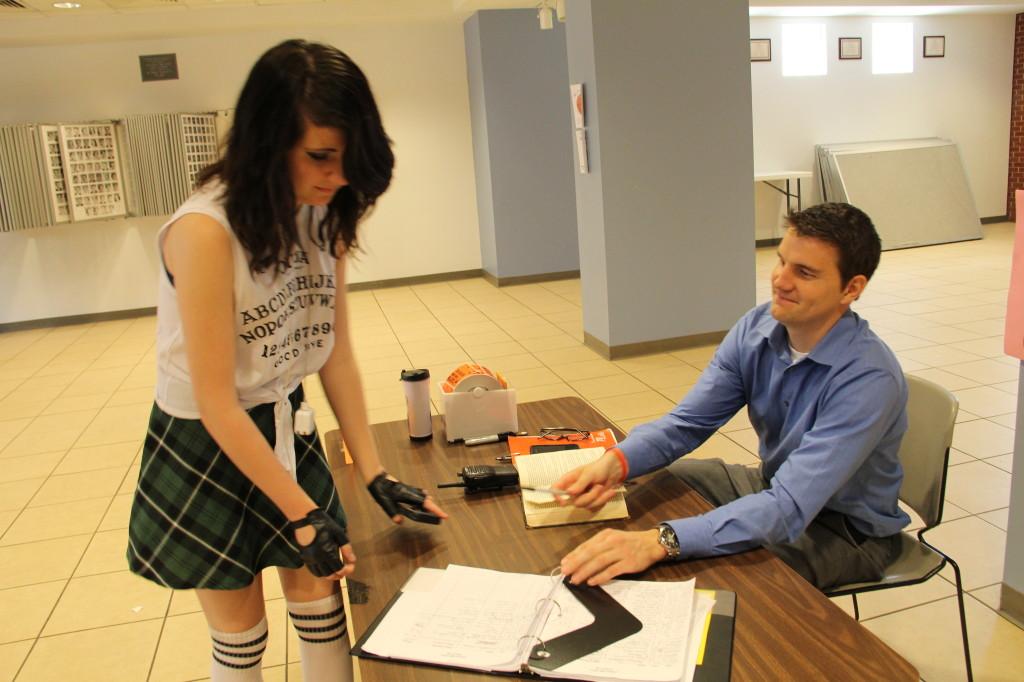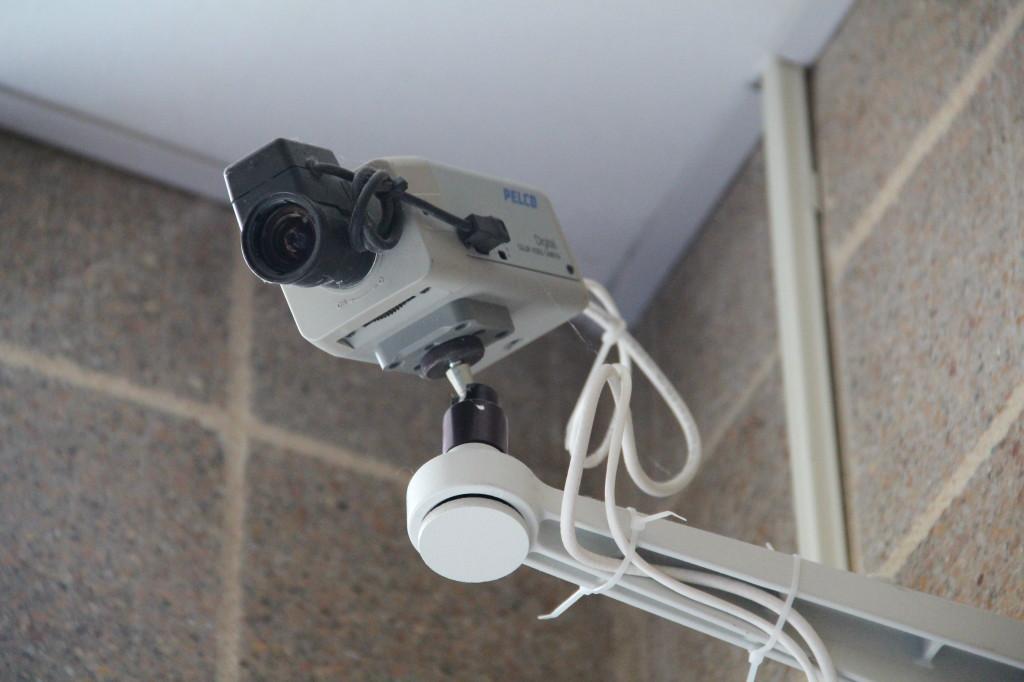At the beginning of the second quarter, students will return to a different kind of open campus. At CHS, subtle but evolving security changes will begin the implementation process. Existing locks will be improved, students will access locked doors with ID cards and campus supervisors will be manning open entrances.
“[I want to be able to] control better who has access to our campus,†Clayton High School Principal Dr. Dan Gutchewsky said. “Starting by the beginning of second quarter (Note: That was the initial timeline but due to some logistical issues the timeline has been pushed until late 1st semester) we will issue ID cards to the students that will allow access to the exterior doors during the school day. Currently all the faculty have these [cards] that work on the exterior doors, but students’ cards will soon also work during the school day. They will be able to access the exterior and still be able to come and go as necessary, but those doors will be locked to anybody who doesn’t have a key card.â€

The key card entry system is not the only security system being put in place.
“We are adding campus supervisors to greet people as they come in and point them in the right direction if they are visiting,†Gutchewsky said. “And while it’s not certainly a perfect system, it does give us a level of control in terms of people that don’t necessarily belong here, or at least being able to know who is on campus and control the flow of people on and off campus.â€
A permanent station has been proposed for campus supervisors at the front entrance of the high school. Work to construct this station will most likely take place over the course of next summer. This station will prevent unwelcome visitors from walking right into the academic hallways, and will provide an extra layer of protection.
Changes After Tragedies
Security has always been an important issue to the Clayton District; however, new emphasis has been placed on student safety after the Newtown elementary school shooting.
“We reviewed our security procedures in response to the the Newtown shootings,†Gutchewsky said. “And engaged in numerous conversations pertaining to security at all of our buildings throughout the District.
Director of Student Services Dr. Greg Batenhorst also cited the Newtown shooting as a motivator.
“The greater focus on security was intensified last year after the Newtown shootings,†Batenhorst said. “So then we went and looked at where we thought we could upgrade safety and security in the District.â€
The Newtown shooting that both administrators referenced was a massacre in which Adam Lanza shot 26 people at Sandy Hook Elementary School in December of 2012. He was not authorized to have access to the building.
Gutchewsky recalled that tragedies have often been the catalyst for security upgrades in schools.
“Anytime you have a school violence,†Gutchewsky said. “Newtown was the most well-known recent incident, but I mean it goes all the way back to when I started teaching in the Columbine era. Being a teacher in that era, it was my first or second year I believe, that changed education in how we looked at school security. It was a very landmark case in everybody’s consciousness.â€
Director of Facility Services Tim Wonish also remembers how security steps have been implemented after major tragedies.
“We had to kind of revisit some things, especially last year with the Newtown shooting in Connecticut,†Wonish said. “We have to look at which safeguards we have put into place, and we started to look at the trends, back in 1998 with Columbine, high schools were made a target. That’s when the SRO position started to come into being, and that has transformed into having officers at almost every high school.â€
The Student Resource Officer, or SRO, is a program in which police officers are stationed at high schools, to help prevent school violence. Currently, the School District of Clayton has two SROs, one at Wydown Middle School, and one at the high school.
A third SRO position is one of the many security enhancements recommended to the Clayton Board of Education. Currently, the District’s two SROs are expected to work part-time at the elementary schools. The third SRO would work full-time at the three elementary schools.
Clayton High School SRO John Zlatic feels that he is often forced to make compromises in time management due to the number of schools he has to work with.
“Obviously with recent shootings that took place at an elementary school,†Zlatic said, “elementary principals are very concerned because they feel vulnerable, also they feel that I spend the majority of my time here.â€
Zlatic feels that a third SRO to work with the elementary students would prove helpful to the District.

“I think its justified with our population here,†Zlatic said. “The age of our population, and the tendency of them to get caught up in stuff. We have thefts, we have fights, we have all kinds of issues that need to be handled. You don’t really see that kind of stuff at the elementary level. But they still want to be protected and they still want to be secured, and I think we are getting close to seeing that we are going to have a third SRO, probably to manage the elementary schools.â€
Zlatic also feels that a specialized SRO for the elementary schools would help as they can focus more on the students there, instead of trying to split their time among kids of broadly different age groups.
“They are able to provide a different kind of service,†Zlatic said. “Where as here … mentoring comes into play. I will sponsor a club, I will work with students at certain levels. But mentoring is a much bigger issue at the elementary schools, trying to set a positive role model, while also providing security.â€
Alongside the addition of SROs in the past, a major security feature installed over the years has been the addition of security cameras throughout the District.
The installation of the cameras began when the District was awarded a grant to increase security.
The cameras immediately proved useful.
Shortly after the introduction of the security cameras, several students stole a master key to the school and broke into CHS on a holiday weekend, stealing 37 computers. However, the theft was filmed by the new security cameras.
“The sad part about it was that I was able to identify [the thief], just by the walk of one student,†Zlatic said. “I had an idea of who I thought it might be, and the size. We were able to check and we were able to find all the computers except for a couple in a closet. We made four arrests at the time. We even found out who stole the key, and were able to charge that person too.â€
Open Campus
The largest problem facing the District’s attempts to secure the high school is one of the most unique and cherished features of CHS – the open campus policy.
Open campus allows students to leave CHS throughout the day, trusting them to return in time for classes. Prior to the security upgrades of 2013, most doors around the school were left unlocked during the school day.
“[Parents] obviously had concerns about the openness of the campus,†Batenhorst said, “and whether or not that would put their children in a more vulnerable spot.â€
Gutchewsky also recognizes the movement to close the campus.
“Every time that there is anything in the media [regarding shootings at schools],†Gutchewsky said. “I’ll get calls from concerned folks saying that we need to lock down the campus. I don’t think that’s the answer.â€
Gutchewsky believes that the recently proposed measures strike a middle ground, bolstering security while also respecting the tradition of the open campus.
“I think that there are people that are concerned about the open campus from a security standpoint,†Gutchewsky said. “You have other people that are just as passionate about maintaining the open campus and not being reactionary. I think that there are really strong arguments on both sides, so I think that this is a step in providing more security but at the same time allowing us to maintain the open campus.â€
Batenhorst also values open campus, while accepting the need to modify its implementation.
“There have always been people with various opinions about it,†Batenhorst said. “But open campus has been a staple of Clayton High School forever and there is not a major movement to get rid of that. I trust that Clayton High School students can do what they need to do with their time and do it wisely. We don’t need to take away that privilege but at the same time I do think it’s important that we bolster the safety and security for all our students in all of our buildings.â€
Officer Zlatic feels that the open campus makes security tougher, but not impossible.
“The biggest challenge is that we’re talking about doing it on a campus that is open, so it makes it really challenging,†Zlatic said. “Impossible? I don’t think so. It just makes it a lot harder than it would be for other places. The philosophy of Clayton is that they like the uniqueness of the open campus and that’s probably going to always stay that way.â€
Mental Health
However, security issues go far beyond the physical component, as the mental health of students is seen as an increasing security concern. Batenhorst cites a survey as the reason for increasing concern for mental health.
“There was a recent survey put out by the Pew corporation,†Batenhorst said. “A public opinion poll, and they were asking people what they thought was the number one measure we could use in regards to making our schools safe, and about 58 percent of the people responded that the greatest focus should be on mental health and the social and emotional health of our students.â€
Gutchewsky supports creating positive relationships between students and staff in order to help the mental health of students.
“In the building everybody wants to feel safe,†Gutchewsky said. “And I think that when you kind of have that common feeling, that’s much more powerful than metal detectors or locking down a campus. That’s one of the reasons that I believe so strongly in cultivating positive relationships with everyone in the campus.â€
Gutchewsky goes so far as to believe that a positive school community will protect itself better than any number of physical security systems.
“I believe the whole relationship piece and cultivating a positive school environment – is so important to school safety,†Gutchewsky said. “Because having 850 or 880 sets of eyes watching out for everyone is much more powerful than just the faculty or anything that security cameras are going to do.â€
But no matter how secure the buildings are, Batenhorst accepts that security is not an end-goal, but a process.
“There have been secure buildings that have been compromised, that have led to tragedies,†Batenhorst said. “Newtown had locked doors. There was a situation in Omaha, Nebraska where an assistant principal was shot, despite the fact that a SRO was right there. When I think about security, I ask myself ‘have I given every opportunity for the buildings to be as secure as they can?’â€
Wonish also realizes that securing the District is a process, changing over time.
“Each year we seem to make a little improvement here or there,†Wonish said. “We’re a long ways from where we were seven years ago.†
Security updates from Clayton High School on Vimeo.













